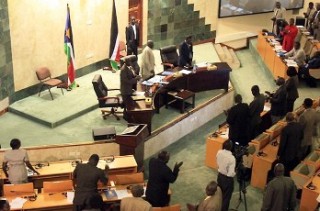S. Sudan’s continuous loan borrowing risky, expert warns
April 30, 2015 (JUBA) – An official from the campaign group, Global Witness, has expressed concerns over last week’s decision by South Sudanese MPs, which gave government to proceed and negotiate a $500 million loan from Qatar National Bank (QNB).

“If this loan is approved at the proposed interest rate, the Qatari bank will be owed almost half of that amount- $781 million, paid back over 7 years,” Vickers blogged on the Global Witness website.
She said amount was the equivalent of the United States government taking out a loan larger than their military and education budgets combined.
“The deal is doubly risky because, if cash is lacking, the government has agreed to pay in the only other currency available to it – oil. Using crude as collateral threatens to lock the country into a dangerous cycle of debt- oil dollars are used to pay off old loans while new loans fund the budget,” wrote Vickers.
“By taking this loan, the government risks selling South Sudan’s future to pay for today,” she further stressed in her recently published blog.
The official said it would have been feasible if money borrowed invested in infrastructure or education, which should create a richer economy in the future; one which is capable of repaying the loan.
There were also concerns on what government considers a priority when spending borrowed funds, with opposition lawmaker seemingly not in support of the decision to borrow the said loan.
“These concerns must be heard and addressed by the government,” said Vickers.
South Sudan’s cabinet affairs minister, Martin Elia Lomoro, cited the ‘dire situation’ of the economy as the reason for borrowing the loan.
The government is reportedly finding is hard to finance its budget, as civil servants, law enforcement officers, and parliament lack funds.
It recently emerged that the president’s office overspent its budget by 369% or $33 million between July and September last year.
“It seems that, while some sectors are without the cash to fulfill basic functions, others are free to spend as they please,” Vickers wrote.
“The inconsistency raises an important question – where will the $500 million be spent? South Sudanese MPs have, quite rightly, demanded more detail on exactly which development projects the cabinet have promised this stop-gap cash to,” she further stressed.
The parliamentarians, Vickers said, must be given time to deliberate the propositions.
“Another critical question is whether the government can tighten its belt elsewhere to avoid taking on more high risk debt?” she said.
“It has yet to demonstrate that the QNB loan is the only way to keep the economy afloat, rather than being the same knee jerk strategy followed by other heavily indebted oil rich countries who have mortgaged their people’s future for short term gain,” Vickers wrote.
(ST)
